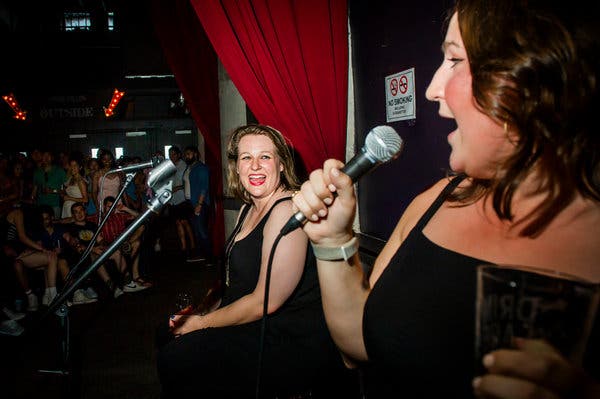Here’s at least one sign that some young adults are disaffected with dating apps. On a sweltering Saturday evening not long ago, 250 men and women in their 20s and 30s packed into a Williamsburg bar without air conditioning to match-make via PowerPoint. Over two hours, a dozen presenters clicked through slides extolling the virtues, idiosyncrasies and dating criteria of their best friends. The event, called DateMyFriend.ppt, was sort of like Tinder meets “The Office.”
Some PowerPoints were heavy on start-up jargon, with “valuation” graphs of suitors’ earning potential or references to “M&A deals,” a.k.a. marriage. Others had more of a class-project vibe, with clip art and embarrassing duckface selfies.
Gabrielle Van Tassel, 25, had come to pitch her best friend Katelyn Dougherty, 31, a literary agent with Midwestern roots. Ms. Van Tassel made a pros and cons list (both of which included “loves Bud Light”) and touted Ms. Dougherty’s love of “Carol,” a movie about a lesbian romance. At least half the slides featured the two of them smiling and goofing off.
The night, it seemed, was less about finding love than celebrating the role of friends in the process.

“You don’t talk to somebody on Tinder or meet up with them until your friends have given you the green light or gushed over him,” Ms. Van Tassel said. “Gone are the days when you say, “‘oh, I’ve been dating this guy for six months, maybe I’ll invite him to meet my friends.’”
Friends have long been each other’s “wing” people, facilitating conversations with strangers at bars or, more recently, delivering judgment on Bumble and Tinder matches. But dating apps have left many people feeling isolated or frustrated and hungering for more real-life interaction.
This, perhaps, accounts for the fact that there are actually three different versions of the PowerPoint event: besides DateMyFriend, which was founded last fall by two 24-year-olds in Boston, there is Tinder Disrupt in San Francisco, the presenters of which are comedians and sketch artists, and Pitch A Friend in D.C., which is billed as “‘Shark Tank’ for your single friends.” (Its inaugural event in June drew over 90 applications for 15 pitch slots.)
There’s also now a dating app designed to combat the loneliness of dating apps, called Ship, that enlists friends in the matchmaking process. Ship was created collaboratively by Betches Media, a lifestyle company for millennial women, and Match Group, which owns Tinder and OkCupid. Users invite a “crew” of friends to sign up with them, swipe for them, and participate in group chats on the platform. To “ship” a couple is a slang term (from fan fiction) meaning to root for them, and 60 percent of matches on the app come from people who are swiping on behalf of their single friends. About 20 percent of people on the app are currently in committed relationships, according to the company: They are there solely to provide support and feedback.
“For the last five to seven years, dating apps haven’t reflected the way that young people actually engage with each other, how they meet, date, talk, gossip about dating life,” said Mandy Ginsberg, Match’s CEO. Young women were “working around, taking screen shots and sending them to friends. It was an obvious miss.”
Jordana Abraham, 29, a founder of Betches and a host of the company’s podcast about dating and relationships (titled: “U Up?”), said her cohort is “settling down later, so friends are involved in our lives in more of a 360-degree way.” She added that young women increasingly treat their friends like significant others (some friendship trips are now jokingly referred to as “honeymoons” and see, also, the rise of “the work spouse”) so why wouldn’t they rely on each other to make an all-important life decision: with whom will you spend your life? “There’s a benefit to crowdsourcing to people who know you best,” she said. “But more than that, it’s less isolating, less stressful.”
Alexa Hagerty, an anthropologist who studies the social impacts of technology, said both Ship and the PowerPoint events combat social isolation in a way that’s particular to young millennials and Gen Z: they merge the digital and the personal. “Tech-mediated, face-to-face connections are not superficial,” she said. “If I’m showing you this guy that I’m interested in on a dating app, that could lead to intimate conversations about what love is and what I want in a partner.”
Adrienne Burfield, 25, a pre-med student at Columbia University studying neuroscience and behavior, said Ship has helped her broaden her horizons. “I get tunnel vision,” she said about certain types of men. Or she’s constantly looking for reasons to reject prospects. With her friends making the matches directly, “I don’t have the opportunity to get in my own way,” she said.
The two people in Ms. Burfield’s “crew” — Jenna Rackerby, 26, and Rico Pesce, 30 — are both in serious relationships. They enjoy Ship, in part because it gives them a vicarious taste of the single life. But it also allows them to look out for the best interests of the friend group; whomever Ms. Burfield ends up dating “is going to be dating the whole crew,” Ms. Rackerby said. “It’s about who will be a good friend,” she added. “Not just a good boyfriend.”
Ms. Dougherty, the Midwestern native who was pitched at Date My Friend, echoed this sentiment. “Especially in cities, you treat your friends as family, and you want your family to love the person you’re with,” she said. In the end, she did not secure a date at Date My Friend, but she appreciated the mission.
“You’re in a room full of people who care about one another,” she said. “In the current dating landscape, it’s so much easier to not do things alone.”







